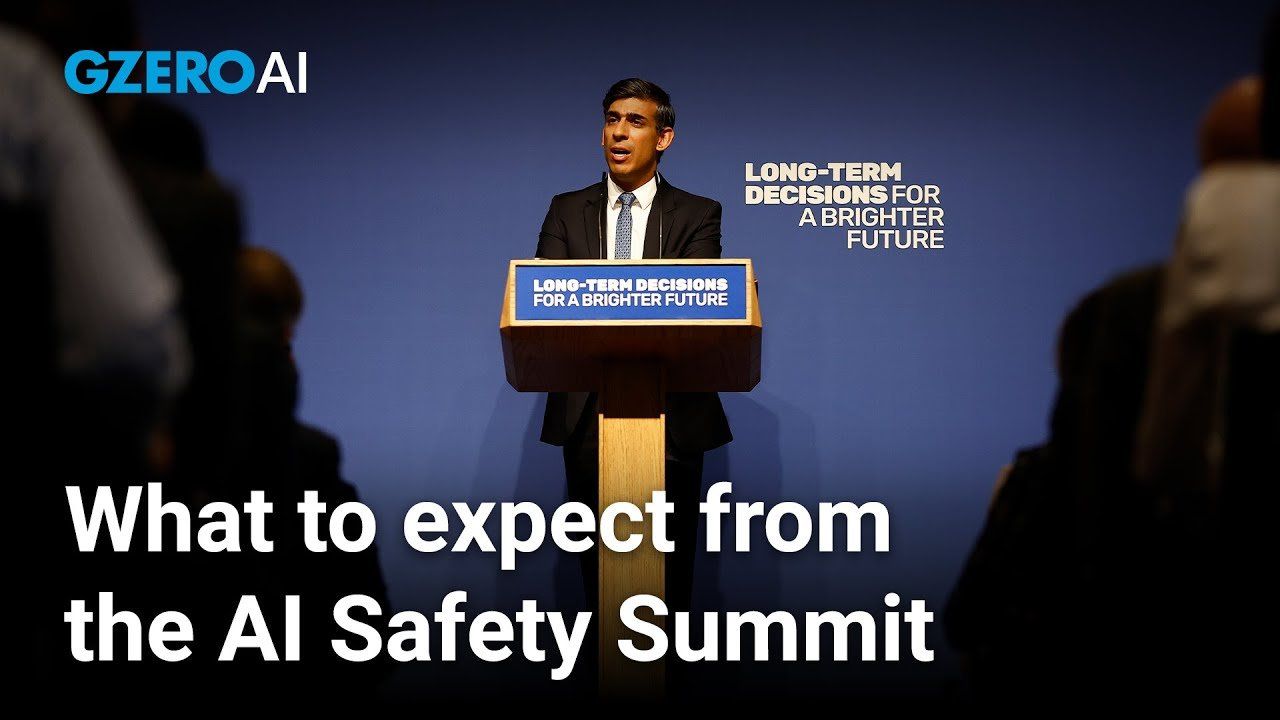Marietje Schaake, International Policy Fellow, Stanford Human-Centered Artificial Intelligence, and former European Parliamentarian, co-hosts GZERO AI, our new weekly video series intended to help you keep up and make sense of the latest news on the AI revolution. In this episode, she previews what to expect from the UK's upcoming AI Summit.
This week takes us to the AI Summit in the UK. This is a little preview, so I don't know yet what the results of the summit will be. But what we can say is that it's a prestige project for the Sunak government. It's been hastily put together. I think a month ago, the invitation wasn't even in my inbox yet, and the government is looking to see what it can deliver, short of calling for regulation, because that is definitely something it wants to stay away from. We've seen speculation that it will come up with something like the IPCC for AI, modeled after the successful Intergovernmental Panel on Climate Change to do something where existing research might be compared, and lessons can be learned about, again, the narrow focus on safety of AI.
I'll be looking specifically at how representative the attendance of the summit will be. In the past, we've seen governments leaning very heavily on bringing CEOs into meetings to talk about AI, but I think it's very important to have multi-disciplinary, multi-stakeholder groups of people thinking about the future of AI, civil society representatives, academics with different views, and other experts that can speak to the lived experience with AI in the here and now. Because frankly, it's not only catastrophic risk that people should be concerned about, but much more present and clear problems that AI causes now.
Discrimination and bias are well-known problems of AI systems, but they're also very harmful for the environment, and we don't talk about that enough. There are concerns about antitrust in AI context, and of course the ease with which disinformation and manipulation can be convincing through synthetic media and how that will harm democracy. I hope that there will be a focus on that as well.
We do know that for the UK, getting investments, getting companies to settle in the United Kingdom to be welcoming to the economic development of AI is important, especially after Brexit. The country has tried to say to the world it's open for business, even if its economy is not doing too well. And as such, it is kind of going against the current of, for example, the EU, which is focusing on hard regulation, a comprehensive AI law in the EU AI Act. But even today, we saw an executive order announced by the White House on AI and a code of conduct presented by the G7.
So, it almost looks as if there are a lot of people who want to steal the UK's thunder, but it's too early to tell. The summit is still to take place, and of course, we will keep you posted on how that goes.
More from GZERO AI: https://www.gzeromedia.com/gzero-ai/
- A vision for inclusive AI governance ›
- The geopolitics of AI ›
- GZERO AI launches October 31st ›
- How AI will roil politics even if it creates more jobs ›
- Regulating AI: The urgent need for global safeguards ›
- Can data and AI save lives and make the world safer? ›
- What does the UK’s Sunak want from Biden? ›
- UK AI Safety Summit brings government leaders and AI experts together - GZERO Media ›
- Should AI content be protected as free speech? - GZERO Media ›
- Is the EU's landmark AI bill doomed? - GZERO Media ›
- AI's impact on jobs could lead to global unrest, warns AI expert Marietje Schaake - GZERO Media ›
- AI regulation means adapting old laws for new tech: Marietje Schaake - GZERO Media ›
- Gemini AI controversy highlights AI racial bias challenge - GZERO Media ›
More For You
At the 2026 Munich Security Conference, entrepreneur and Project Liberty founder Frank McCourt makes the case that the internet, and the AI systems rapidly reshaping it, must be redesigned to serve people, not platforms.
Most Popular
At the 62nd Munich Security Conference, Parag Khanna, founder and CEO of AlphaGeo, says globalization isn't dead, it's evolving. Speaking with GZERO’s Tony Maciulis, he explains that countries are forming flexible alliances that expand and shrink based on their interests. “You’d rather be in the tent...if it suits your interest than not in it,” Khanna notes, highlighting how the US, Europe, and Asia are adapting to shifting global priorities.
Sovereignty has become one of the most powerful, and least defined, words in tech policy. At the 2026 Munich Security Conference, SAP global head of government affairs, Wolfgang Dierker, explains why governments and enterprise customers are demanding more control over their data, cloud infrastructure, and AI systems amid rising geopolitical uncertainty.
On the sidelines of the 2026 Munich Security Conference, Annemarie Hou, Executive Director of the United Nations Office of Partnerships, joined Tony Maciulis to discuss the power of women leaders in global decision-making.
